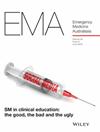A Qualitative Examination of Job Satisfaction in Emergency Medicine From the Perspective of Physicians Also Working in Prehospital and Retrieval Medicine
Abstract
Objective
Low job satisfaction amongst emergency physicians is a significant risk to career sustainability. Anecdotal evidence suggests that prehospital and retrieval medicine (PHARM) physicians experience relatively high job satisfaction. The objective of this qualitative study was to explore the research question: ‘What influences job satisfaction and sustainability for emergency physicians who maintain dual roles in PHARM and the emergency department?’
Methods
Eligible emergency physicians from Australia and New Zealand were interviewed in-depth about their experiences and perceptions of job satisfaction and sustainability. The research team applied experiential knowledge and an inductive analytic approach to construct a conceptual understanding of the physicians' job satisfaction from the data, including factors contributing to career sustainability.
Results
Our sample included 11 participants, six from Australia and five from New Zealand. We identified six key themes influencing job satisfaction: workload, job factors, personal factors, focus on well-being, culture and management and bureaucracy. These are explored in detail, along with ideas on career sustainability.
Conclusions
The nature of emergency medicine work remains inherently satisfying for participants in this study but is influenced by the culture and current working conditions found in many emergency departments, particularly when these factors impact the standard of clinical care physicians feel they can provide. Our findings offer practical guidance on protective factors for job satisfaction and sustainability, including fractional appointments, diversity and flexibility of practice, continuous professional development and access to professional supervision or peer support. Preserving career longevity in emergency medicine requires the implementation of evidence-based, sustainable initiatives.

 求助内容:
求助内容: 应助结果提醒方式:
应助结果提醒方式:


